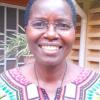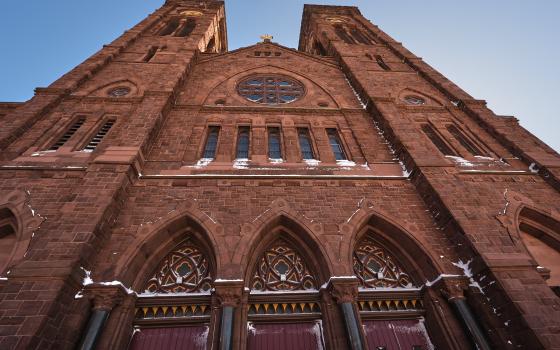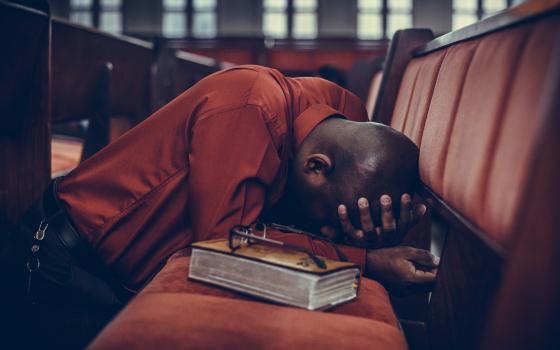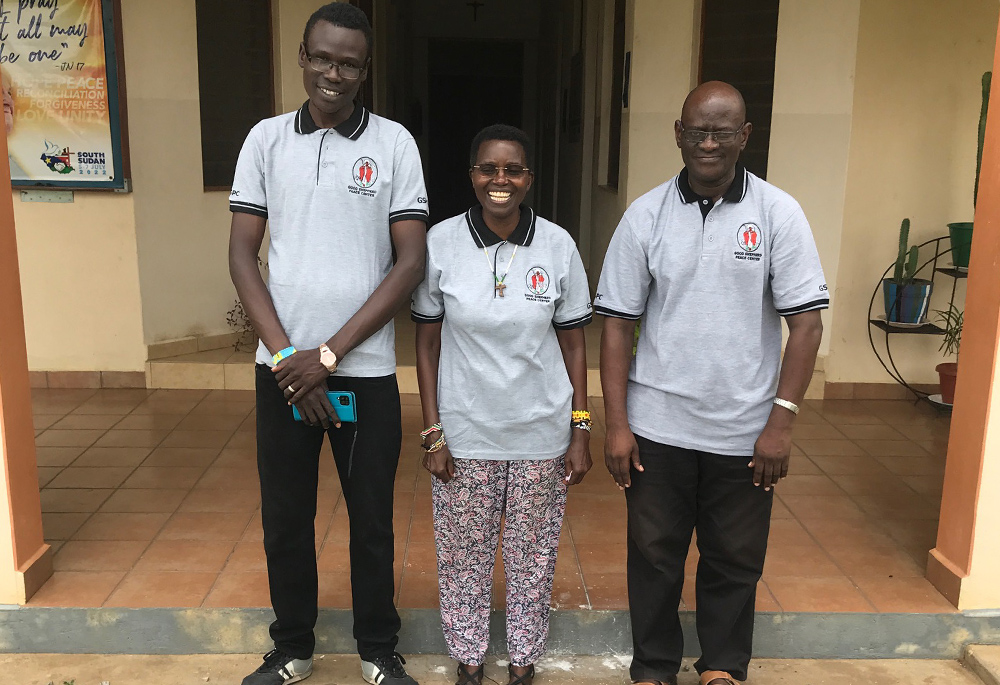
Sr. Scholasticah Nganda is pictured with two staff members of the Good Shepherd Peace Centre-Kit, a few miles south of Juba, in South Sudan. Nganda writes about how she and her colleagues try to keep hope alive in a country in turmoil and conflict. (Courtesy of Scholasticah Nganda)
Editor's note: Global Sisters Report's new series, Hope Amid Turmoil: Sisters in Conflict Areas, offers a look at the lives and ministries of women religious serving in dangerous places worldwide. The news stories, columns and Q&As in this series will include sisters in Ukraine, Nigeria, Kenya, Sri Lanka, Nicaragua and more throughout 2023.
When did you last pause and reflect on your life in community and in ministry, in unfamiliar circumstances? What if you were invited to choose between your comfort zone and other zones that stress and stretch your capacities? What if you had to reimagine possibilities for thousands of people living on the periphery, marginalized by inherent systemic injustices, exploitation, violence and natural disasters?
I am ministering in South Sudan, a country in turmoil and conflict. I invite you to stretch your imagination and visualize yourself as a messenger of hope in the midst of turmoil. This reflection shares how my community and colleagues and I try to keep hope alive in circumstances of utter helplessness and vulnerability.
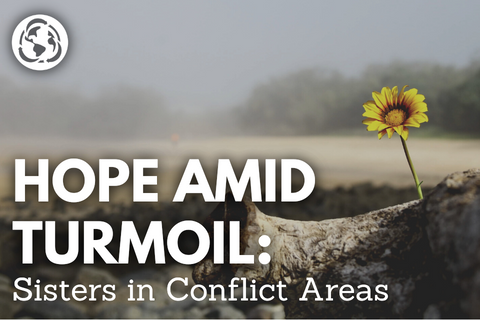
When I volunteered for the Solidarity with South Sudan Mission, an initiative of the Union of International Superiors General (or UISG) and Union of Superiors General (or USG), I barely knew the depth of trauma that existed in South Sudan. I was not aware that tens of thousands of South Sudanese had been killed while millions of them are living in neighboring countries as refugees. Gaining independence for South Sudan in 2011 did not usher in political stability. Shocking and paradoxical, isn't it?
Every day in South Sudan opens my eyes to the plight of women and children, who continue to pay a heavy price in the ensuing inter-tribal and ethnic conflict. While the men fight, thousands of women are left behind to carry the day-to-day yoke of fending for their families. Women are seen digging their farms and fetching water for their families while the men are fighting or away grazing huge herds of cattle. (A man who possesses many cattle is considered to be a rich man in South Sudan since cattle are used to pay bride price.)
Many families in South Sudan are headed by women since the men are absent. With absent husbands, most women live by their wits, tending small farms, minding their children and running small businesses — like selling fruits and vegetables or home-brewed alcohol — to generate income for their families.
Advertisement
You may find it easy to read about war, guns and bullets. You may have no difficulty visualizing troops headed for peacekeeping missions in Syria, Somalia or South Sudan. I have not found it easy to live imagining that a gun could be fired at me any time, day or night. Living in South Sudan, it is not uncommon to hear gunshots coming from all directions. In September 2022, rebel forces killed one of the seven security men who guard the Good Shepherd Peace Centre-Kit, or GSPC,, where our Solidarity Pastoral Team members live. To this day, we do not know the reason for this attack! Worse still, efforts to seek justice for the family members of the murdered soldier have been met with crippling resistance.
Anytime I recall the brutal murder of our soldier Lipoy (not his real name), a cold shiver goes down my spine! Why did Lipoy have to die? What crime did he commit? On that fateful day, Lipoy stayed in the GSPC all day long. Unanswered conflict-related questions like these fill my mind as I minister in South Sudan. Likewise, some of my colleagues — both foreign and South Sudanese — struggle to find answers to similar questions. However, with fighting that often erupts with the least provocation among South Sudanese, maybe we are looking for answers to the wrong questions.
I have not found it easy to live imagining that a gun could be fired at me any time, day or night. Living in South Sudan, it is not uncommon to hear gunshots coming from all directions.
Talking to the women who participate in the Solidarity trauma healing workshops that Solidarity offers across the country, I have heard stories of women who live with the shame of gang rape or rape by a family member. Horrendous narratives, told by women and young girls forced by family to marry older men they did not know, have left me vicariously traumatized and in need of psychological support. Indeed, my lived experience since 2020 has been one of personal and professional challenge. Nevertheless, it has not all been bleak. There have been rewarding professional experiences in the moments of sadness.
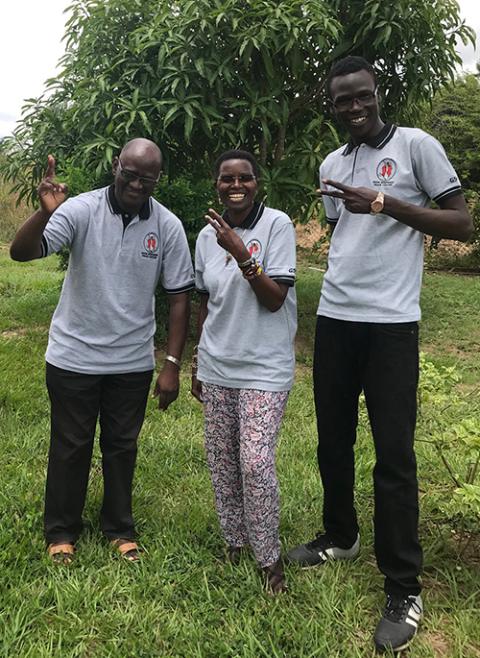
Sr. Scholasticah Nganda is pictured with two staff members of the grounds of Good Shepherd Peace Centre-Kit. (Courtesy of Scholasticah Nganda)
Sometimes hope has been ignited in me and in those I serve. Moments of my attentive listening to people who need help have enabled the other person to become aware of their inner strengths — the power that helps in navigating challenging life situations. While it has given me fulfillment seeing others beam joyfully with revitalized hope, it saddens me to know I have no access to a formal debriefing place or a trained professional to support me in my work with traumatized people.
In vain, I have searched for a professional counselor for this support. I have found it challenging to work with traumatized people with no personal supervision of my own. I would not wish this experience for anyone! Now and then, I have accessed online supervision that proved helpful but very costly. Peer supervision is not an option as one finds oneself almost in a ministry all by him/herself. With almost no one with whom to discuss my work-related problems, I view this challenge as a dark cloud. I can only hope and wait for the sun to rise one day! In my own helplessness and vulnerability in my ministry in South Sudan, I have leaned on my faith in a loving and caring God. In God, my energy to serve has been affirmed and reinforced.
I do not expect for South Sudan to be flooded with professional psychologists working as supervisors, but I believe the psychology department in the University of Juba may train some people as professional counselors, who would then offer this needed service.
As a missionary in South Sudan, I have learned to take in the pain of my people as they narrate their horrific stories, narratives that sometimes tore my heart. I have listened and heard women who have had to travel for days, hiding in bushes and surviving on grass and wild fruit as they made their way to what they imagined to be safe haven, either with relatives in distant villages or to church grounds. Keenly listening, I have heard details of how these people navigated their way through challenging and trying circumstances, and I have been left in awe by their resilience. Their survival in an environment enveloped by violence of untold magnitude tells of a people determined to beat all odds. Evidently, the majority of ordinary South Sudanese are determined to keep alive the independence dream of 2011, to move — as the pope said on Feb. 3 — "from words to deeds."
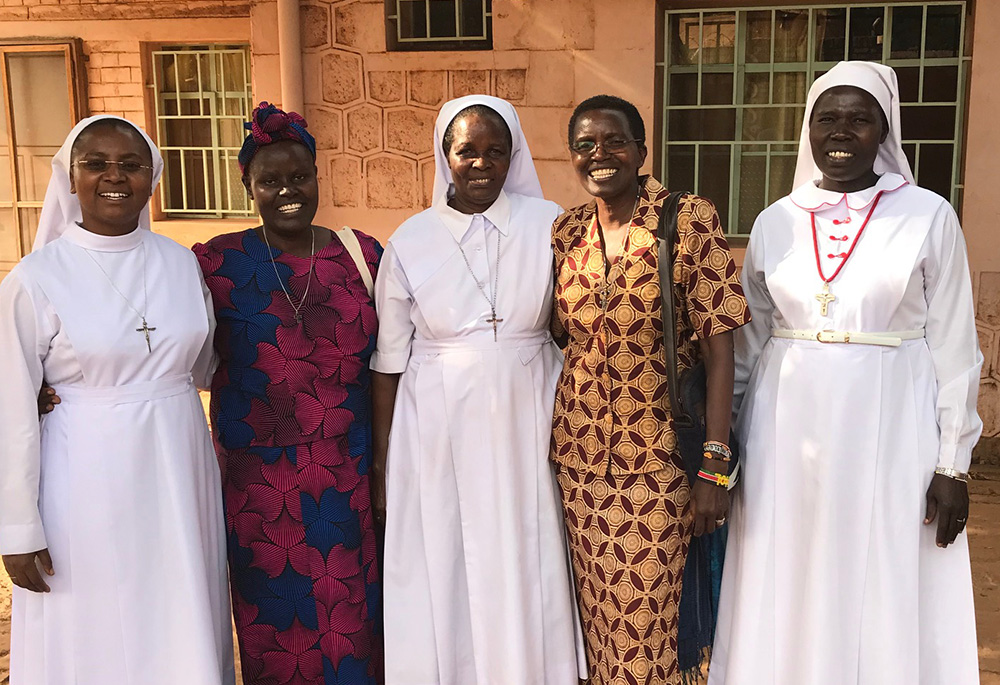
Sr. Scholasticah Nganda with religious of the Wsu Diocese in South Sudan (Courtesy of Scholasticah Nganda)
Who would not want to partner with a people who aspire to self-liberation? The South Sudanese I have met and to whom I have ministered want to be actors in their own liberation. I too desire to play my role in this joined struggle for a future full of hope for South Sudan. The people of South Sudan have hope, an inspiration to work towards peace and a better future. They dream of a better tomorrow, a transformed South Sudan that will once more focus on care of its people: education for the children, improved health care, functioning infrastructure and security for all.
Visualize such a country and you would find a reason to have physically or virtually celebrated with South Sudan as she welcomed Pope Francis, Justin Welby, the Archbishop of Canterbury and the symbolic head of the Anglican Communion, and the Rev. Iain Greenshields, the moderator of the Church of Scotland, on their recent "pilgrimage of peace" to South Sudan.
